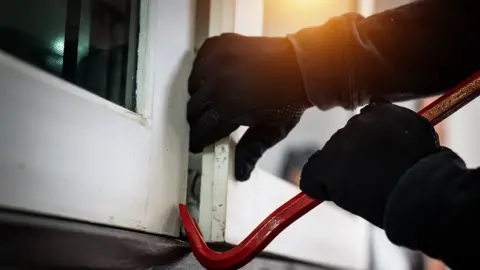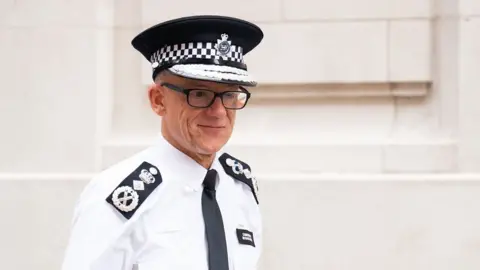Police in England and Wales pledge to attend every home burglary
 Getty Images
Getty ImagesPolice chiefs in England and Wales have pledged to send an officer to every single burgled home.
The pledge commits forces to sending an officer to investigate every report of home burglary, regardless of location and what has been stolen.
All 43 forces agreed to the commitment at last week's meeting of the National Police Chiefs' Council.
Its chairman Martin Hewitt said the move was aimed at giving people "peace of mind".
The pledge follows a report from the police watchdog in August which found most victims of burglary, theft and robbery in England and Wales were not being given the justice they deserve.
The findings from His Majesty's Constabulary and Fire and Rescue Services (HMICFRS) showed while some forces tackle these crimes well, many do not.
In the year to March, Home Office figures showed just 6.3% of robbery offences and 4.1% of thefts in England and Wales resulted in charges, while recent figures found police attendance at burglaries in London had fallen to 50%.
Mr Hewitt said some forces had struggled to attend all burglaries because of "limited resources".
"We want to give people the peace of mind of knowing if you experience that invasion, the police will come, find all possible evidence and make every effort to catch those responsible," Mr Hewitt wrote.
"That's a critical part of the contract between the police and public."
Mr Hewitt added that burglary was "invasive" and could be "deeply traumatic" for victims.

What will be the impact?
By Daniel Sandford, BBC home affairs correspondent
The pressure has been building on forces to improve their response to burglary for several months now.
In August the police inspectorate HMICFRS produced a devastating report.
It said opportunities were being missed to catch burglars and to protect repeat victims, because forces were not sending an officer to every burglary.
Then last month the new Home Secretary Suella Braverman wrote to every force in England and Wales saying the public wanted police to visit after crimes as intrusive as burglaries.
Greater Manchester Police, which adopted the policy last year, says arrests and detections are up. But it is probably too soon to know if this is having a long-term effect on the number of burglaries.
There is also a resourcing issue. When police forces that are currently not attending every burglary adapt their policy to abide by this new rule, what will they stop doing to free up the resources?

The plan is to prioritise incidents where a home has been burgled, as opposed to outbuildings and garden sheds.
Sara Thornton, previous head of the NPCC, told the BBC in 2015 that budget cuts and the changing nature of criminality meant the public should not expect to see an officer after crimes such as burglary.
The latest agreement, signed up to by all forces in England and Wales, follows similar commitments from several services across the country, including the Metropolitan Police Service.
The Met's recently-appointed commissioner, Mark Rowley, last month said his officers would "get back" to attending all reports of burglary in London.
 PA Media
PA MediaSir Mark told the BBC a crime as severe as burglary needed a "proper policing response" and described the Met's low attendance record as "unacceptable".
"We're never going to turn up to every single crime, and the public understand that, but something as severe as burglary needs a proper policing response," he said.
"It's too serious an intrusion not to have somebody turn up".
Greater Manchester Police committed to attend every report of burglary in July last year and said it had since seen "a number of positive results", including a 95.8% increase in arrests between August 2021 and July 2022.
Supt Chris Foster, the force's lead for tackling burglary, said: "It is therefore only right that we use all of our policing powers to deal with those individuals who invade the homes of others and steal their property.
"While there is still much progress yet to be made, there is also a lot to be proud of in what has been achieved so far."

Have you been affected by issues covered in this story? Please get in touch by emailing: [email protected].
Please include a contact number if you are willing to speak to a BBC journalist. You can also get in touch in the following ways:
- WhatsApp: +44 7756 165803
- Tweet: @BBC_HaveYourSay
- Upload your pictures/video here
- Or fill out the form below
- Please read our terms & conditions and privacy policy
If you are reading this page and can't see the form you can email us at [email protected]. Please include your name, age and location with any submission.
